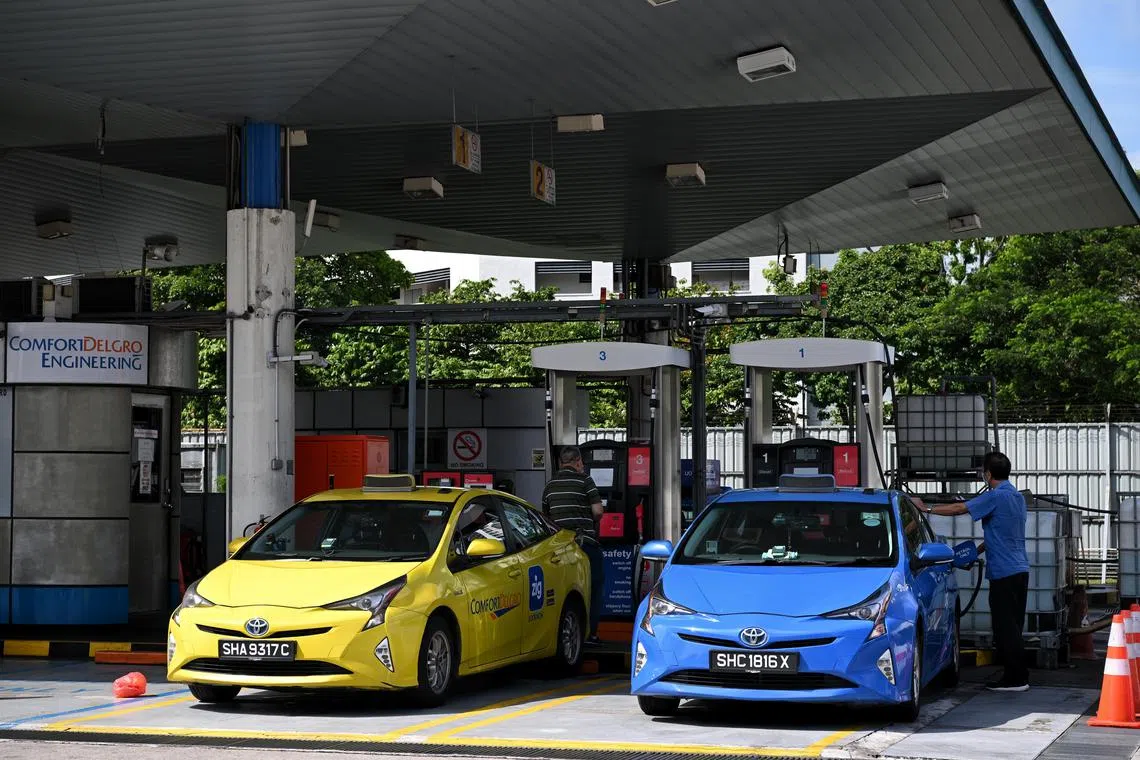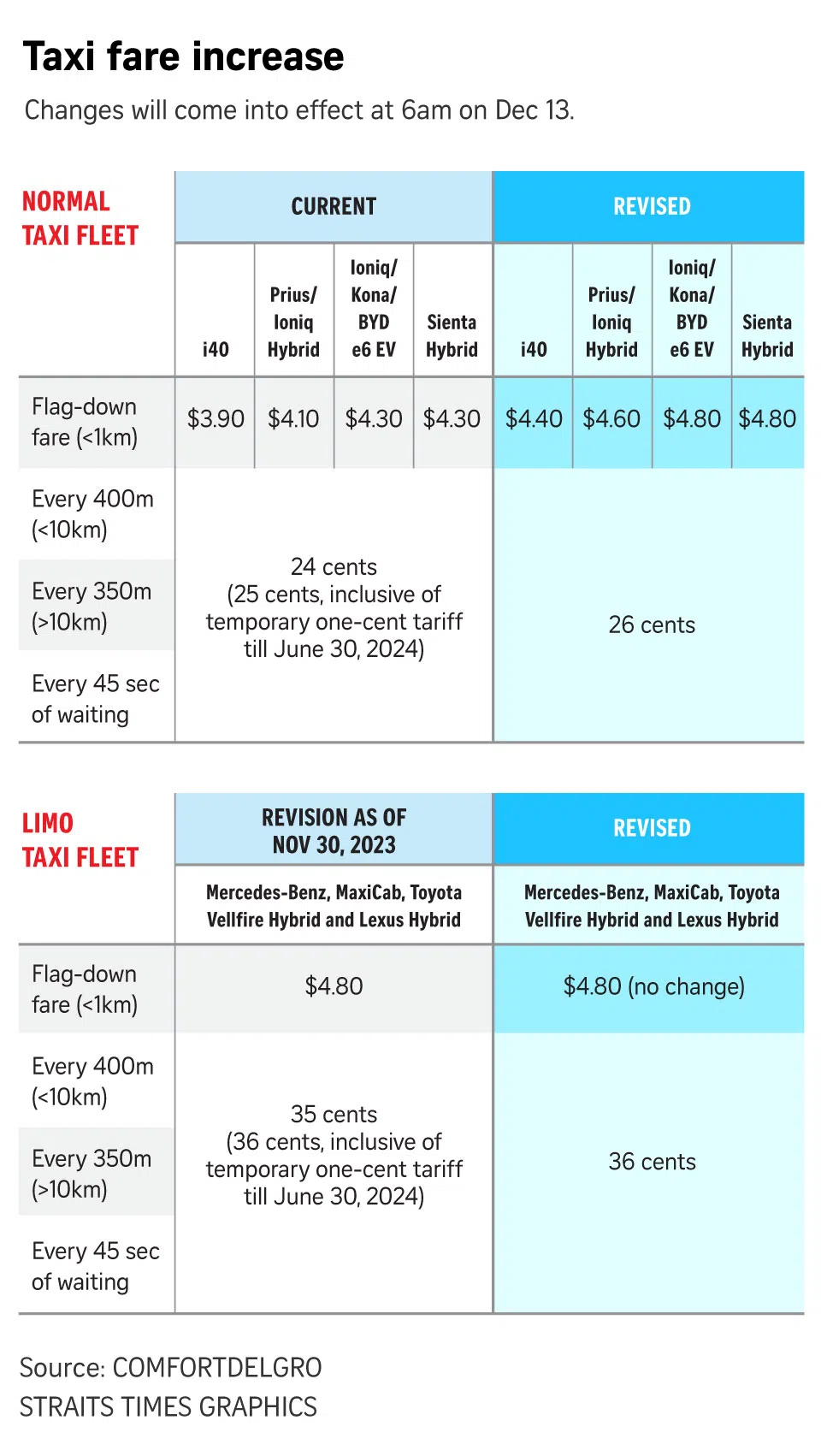ComfortDelGro to raise cab fares from Dec 13; Prime Taxi to go down the same route
Sign up now: Get ST's newsletters delivered to your inbox

The flag-down fares of ComfortDelGro taxis will increase by 50 cents from Dec 13.
ST PHOTO: KUA CHEE SIONG
Follow topic:
SINGAPORE - Singapore’s largest taxi operator ComfortDelGro will raise flag-down fares by 50 cents for its regular taxis, as well as distance and time-based charges by one cent, from 6am on Dec 13.
This is to help drivers defray higher operating costs due to rising fuel prices, high inflation and the upcoming goods and services tax hike from 8 per cent to 9 per cent
As at October, ComfortDelGro ran a fleet of 8,841 Comfort and CityCab taxis, or about 64 per cent of the market, based on figures from the Land Transport Authority.
Another taxi operator, Prime Taxi, told The Straits Times it also plans to raise its fares.
After the adjustments, the starting fare of a ComfortDelGro Hyundai i40 taxi will increase from $3.90 to $4.40, while that for a Toyota Prius and a Hyundai Ioniq Hybrid taxi will climb from $4.10 to $4.60.
Flag-down fares for Hyundai Ioniq, Hyundai Kona, Toyota Sienta Hybrid and BYD e6 taxis will increase from $4.30 to $4.80.
The increase in ComfortDelGro’s starting fares does not apply to limousine taxis, such as MaxiCab and Mercedes-Benz taxis. Flag-down fares for the limousine fleet will remain at $4.80, after an increase from $4.10 in November.
But charges for distance travelled and wait times will rise for all its fleets. For regular taxis, there will be a one-cent increase for distance rates to 26 cents for every 400m under 10km and every 350m after 10km, up from 25 cents, which is inclusive of a one-cent temporary fare tariff in effect till June 30, 2024.
There will also be a one-cent increase for limousine taxis, with distance and time-based fares increasing by intervals of 36 cents instead of 35 cents.
With the adjustment, the estimated fare for a 10km trip in a normal taxi during off-peak hours will go up by 6.8 per cent, or 94 cents, from $13.80 to $14.74.
The operator last raised its fares in March 2022, the first increase in a decade. That adjustment included a 20-cent increase in flag-down fares for both normal taxis and limousines.
On Dec 6, ComfortDelGro also announced that it would extend the period during which an evening peak-hour surcharge applies by an hour.
It will cover the period from 5pm to 11.59pm from Mondays to Sundays, including public holidays. Currently, the peak-hour surcharge is in effect from 6pm to 11.59pm. A peak-hour surcharge will also be introduced from 10am to 1.59pm on weekends, including public holidays.
At present, ComfortDelGro imposes a peak-period surcharge of 25 per cent of the metered fare.

Mr Tommy Tan, chief executive of ComfortDelGro’s taxi business, said the increase ensures that its drivers receive fair earnings with the rising cost of operations.
“For the past few years, our cabbies’ earnings had been impacted first by the pandemic, and then by higher operating expenses due to an increase in fuel prices and high inflation,” he said.
The peak-hour surcharge changes also ensure that there are enough taxis on the road to meet rising commuter demand at peak hours, he said.
Since the onset of the Covid-19 pandemic in April 2020, ComfortDelGro has provided its drivers with rental waivers and continues offering a waiver of 10 per cent.
National Taxi Association adviser Yeo Wan Ling said the higher takings from the fare increase will help drivers support their families better.
“The impending increase in GST is also an additional cost on their operations, as it impacts their rental, food and parking expenses, among others,” she added.
ComfortDelGro taxi driver Chan Pak Kin, 70, told ST the increased fares do not go far enough to alleviate rising operating costs.
“The additional amount will be erased once I get a fine for speeding or a parking summons. The company should look at reducing the rental costs instead,” he said.
The higher fares could also turn potential customers away, he added. They might instead opt for ride-hailing trips with companies such as Grab if they offer lower fares.
Mr Macarius Chia, who often uses a taxi or private-hire car to get around, said he will likely opt for ride-hailing services such as Tada when the fare increase kicks in.
The 25-year-old freelance photographer said: “(ComfortDelGro) might lose their customer base. There are many ride-hailing companies that are almost always cheaper and offer occasional ride discounts.”
Mr Neo Chee Yong, deputy general manager of motor group Prime, which operates Prime Taxi, said the company will also adjust its fares to help drivers cope with higher operating costs and inflation. He declined to disclose the extent of the increase and when it would take effect.
At present, the flag-down rate for Prime, the smallest taxi operator here with 532 taxis as at October, ranges from $4.10 to $4.50.
Ms Jasmine Tan, general manager of taxi firm Trans-Cab, said the company will roll out the same peak-hour surcharge adjustments as ComfortDelGro from Dec 13.
The company has not decided if fares should be increased, she added.
“Prices for everything, including housing and petrol, are rising, so we want to help our drivers cushion their operating costs,” said Ms Tan.
Right now, Trans-Cab, Singapore’s third-largest operator with about 2,100 taxis, applies the same peak-hour surcharge as ComfortDelGro.
Strides Premier, Singapore’s second-largest operator with about 2,200 taxis, said it “will be monitoring the situation closely before making any decision” on fare adjustments.
Correction note: An earlier version of this story wrongly stated the prices for the rental of ComfortDelGro’s taxis. The prices were for ComfortDelGro’s commercial rental vehicles. We are sorry for the error.


